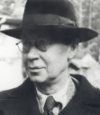
Sergei Prokofiev
In retrospect, its a brilliant ploy. Liszt did it with his
Rhapsodies, Paganini did it with his 24
Caprices, and even Brahms was not immune with his
Intermezzi. A struggling, unknown composer who is also a struggling, unknown pianist can write a work for himself to perform, a work that can be tailored to show off the best of his brilliance as a composer and pianist.
For Prokofiev, this musical
curriculum vitae was his
Toccata, opus 11 written in 1912, when he was 23 years old. It was revolutionary, as was the mood of the times, and set Prokofiev's life's course. The
Toccata's influence can be heard in many of Prokofiev's later, more mature works, especially the third and fifth piano concertos.
The
Toccata was like no other music heard before. It is driving, motoric, percussive, dissonant, relenting only briefly to build up for the final explosion. Its manic and maniacal, the devil let loose on the keyboard.
Its also fiendishly difficult to play, and here is a work where faster
is better. Fast is the whole point of the
Toccata. Vladimir Horowitz does it in exactly four blistering minutes.
Horowitz was a champion of Prokofiev's music in the West. He was the first to perform his so-called
War Sonatas (numbers 6, 7 and 8) in the United States. This CD includes the world premier recording on the Seventh from 1945, necessarily a mono recording. On hearing it, Prokofiev sent Horowitz a signed manuscript of the score, inscribed “to the miraculous pianist, from the composer”.
This is a “love it”, or “hate it” recording of the Seventh, despite Prokofiev's stamp of approval. The “hate it”s call it sluggish, the “love it”s call it thoughtful. This is music from a terrible time, full of pathos and bittersweet lyricism. Horowitz captures that mood perfectly.
Also included are almost unknown sonatas from Samuel Barber (a personal friend of Horowitz) and Kabalevsky, and short works by Gabriel Faure and Francis Poulenc. An unusual and intelligent selection, eye-opening in its breadth and mastery.
But its the 4 minute
Toccata that makes this CD what it is - essential. But unfortunately (or fortunately) there is another recording equally essential, that by a 19 year old Martha Argerich. So much so that we at Good-Music-Guide.com have decided to take a slightly different tack this week, focussing on a particular piece of music, namely the
Toccata, rather than a particular CD.
Martha Argerich - Serious Competition
Prokofiev's
Toccata is as much about the pianist as the music itself. And a more different pianist to Vladimir Horowitz you could not find than Martha Argerich. Both technically brilliant, Argerich is about showmanship where Horowitz is refinement, Horowitz full of self doubt and anxiety, Argerich brash, bold and a risk-taker.
Martha Argerich was just 19 when she made this Debut Recital in 1960. The range of tone is wide, from the masculine, explosive
Toccata through the moody Brahms
Rhapsody Op. 79, the beautiful song-like Chopin
Barcarole to the seductive Ravel
Jeux d'eau (she later made a masterful recording of Ravel's
Gaspard de la Nuit). DG have added a 1971 recording of Liszt's
Sonata in B minor, a very full CD in both time and emotional impact.
Argerich's version of the Prokofiev
Toccata resets the standard for this work. Prepare to be stunned; you may find yourself holding your breath until the end. Argerich combines virtuosity with bravura to come up with music uniquely Argerich, but utterly convincing.
The greatest debut recital ever.
Please support Good-Music-Guide.com
by purchasing this CD using this link.

Track Listing
Vladimir Horowitz (piano)
Sergey Prokofiev
Toccata and Piano Sonata no.7
and other lesser known 20th century piano music
Prokofiev, Piano Sonata no.7 “War Sonata” Op.83
- I. Allegro Inquieto; Andantino
- II. Andante Caloroso
- III. Precipitato
Samuel Barber, Piano Sonata Op.26
- I. Allegro Energico
- II. Allegro Vivace E Leggero
- III. Adagio Mesto
- IV. Fuga: Allero Con Spirito
Dimitri Kabalevsky, Piano Sonata No. 3 in F major, Op. 46
- I. Allegro Con Moto
- II. Andante Cantabile
- III. Allegro Giocoso
- Prokofiev, Toccata, Op.11 In C
- Gabriel Faure, Nocturne for piano for 13 in B Minor, Op. 119
- Francis Poulenc, Presto for piano in B flat major, FP 70
Martha Argerich (piano)
Debut Recital
Works by Brahms, Chopin, Ravel, Prokofiev and Liszt
- Chopin, Scherzo No.3 in C#, op.39
- Brahms, Rhapsody, Op.79: No.1 in b: Agitato
- Brahms, Rhapsody, Op.79: No.2 in g: Molto Passionato, Ma Non Troppo
- Prokofiev, Toccata, Op.11
- Ravel, Jeux D'eau: Tres doux
- Chopin, Barcarole in F#, Op.60
- Liszt, Hungarian Rhap No.6
Franz Liszt, Sonata, for piano in B minor, S. 178
- Lento Assai - Allegro Energico
- Grandioso
- Cantando Espressivo
- Pesante - Recitativo
- Andante Sostenuto
- Quasi Adagio
- Allegro Energico
- Piu Mosso
- Cantando Espressivo Senza Slentare
- Stretta Quasi Presto - Presto - Prestissimo
- Andante Sostenuto - Allegro Moderato - Lento Assai